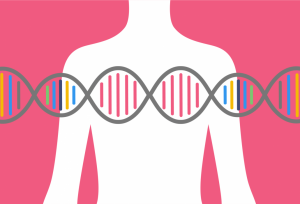Mindfulness Improves Breast Cancer Symptoms in Women with Particular Genetic Polymorphisms
By John M. de Castro, Ph.D.
“mindfulness-based stress reduction can be effective in alleviating anxiety and depression, decreasing long-term emotional and physical side effects of treatments and improving the quality of sleep in breast cancer patients.” – BCRF
Receiving a diagnosis of cancer has a huge impact on most people. Feelings of depression, anxiety, and fear are very common and are normal responses to this life-changing and potentially life-ending experience. But cancer diagnosis is not necessarily a death sentence. Over half of the people diagnosed with cancer are still alive 10 years later and this number is rapidly increasing. But, surviving cancer carries with it a number of problems. Anxiety, depression, fatigue and insomnia are common symptoms in the aftermath of surviving breast cancer. These symptoms markedly reduce the quality of life of the patients.
Mindfulness training has been shown to help with cancer recovery and help to relieve chronic pain. It can also help treat the residual physical and psychological symptoms, including stress, sleep disturbance, fear of reoccurrence, and anxiety and depression. The genes are known to be highly involved in the development of cancer and mindfulness training has been shown to alter the genes. The genes differ considerably between different individuals. It is possible that mindfulness training may improve cancer symptoms in patients with particular genetic polymorphisms. Identifying these polymorphisms could then help in identifying patients who would respond best to mindfulness training.
In today’s Research News article “Translational genomic research: the role of genetic polymorphisms in MBSR program among breast cancer survivors (MBSR[BC]).” (See summary below or view the full text of the study at: https://www.ncbi.nlm.nih.gov/pmc/articles/PMC7184864/ ) Park and colleagues recruited adult women who were at least 2 weeks since the end of treatment for breast cancer and randomly assigned them to a usual care wait-list control condition or to receive 6 weekly 2-hour sessions of Mindfulness-Based Stress Reduction (MBSR) program. The program consists of discussion, meditation practice, body scan, and yoga along with daily home practice. They were measured before and after training and 6 weeks later for anxiety, depression, perceived stress, fatigue, pain, and quality of life.
At baseline blood was drawn for genetic analysis. They assayed the blood for 10 single-nucleotide polymorphisms (SNPs) that had been shown in the past to be associated with the symptoms of women recovering from breast cancer. They found that 3 SNPs, rs4680 in COMT, rs6314 in HTR2A, and rs429358 in APOE were associated with improvements in symptoms produced by the Mindfulness-Based Stress Reduction (MBSR) program. The symptom improvements associated with these SNPs were depression, fatigue, pain, and quality of life.
Mindfulness training has been shown to improve the residual symptoms present in women recovering from breast cancer. The present results suggest that the effectiveness of mindfulness training in improving these symptoms is different for women with different genetic profiles. These findings may prove useful in tailoring treatment for the women to maximize its impact. Women with single-nucleotide polymorphisms (SNPs), rs4680 in COMT, rs6314 in HTR2A, and rs429358 in APOE would be good candidates for treatment with Mindfulness-Based Stress Reduction (MBSR). Women without these SNPs may be better treated with other treatments.
So, mindfulness improves breast cancer symptoms in women with particular genetic polymorphisms.
“When used in a cancer setting, mindfulness can help patients cope with their disease and its treatment.” – Carrie Ernhout
CMCS – Center for Mindfulness and Contemplative Studies
This and other Contemplative Studies posts are also available on Google+ https://plus.google.com/106784388191201299496/posts and on Twitter @MindfulResearch
Study Summary
Park, J. Y., Lengacher, C. A., Reich, R. R., Alinat, C. B., Ramesar, S., Le, A., Paterson, C. L., Pleasant, M. L., Park, H. Y., Kiluk, J., Han, H., Ismail-Khan, R., & Kip, K. E. (2019). Translational genomic research: the role of genetic polymorphisms in MBSR program among breast cancer survivors (MBSR[BC]). Translational behavioral medicine, 9(4), 693–702. https://doi.org/10.1093/tbm/iby061
Abstract
Genetic variations of breast cancer survivors (BCS) may contribute to level of residual symptoms, such as depression, stress, fatigue, and cognitive impairment. The objective of this study was to investigate whether particular single-nucleotide polymorphisms (SNPs) moderated symptom improvement resulting from the Mindfulness-Based Stress Reduction for Breast Cancer (MBSR[BC]) program. An overarching goal of personalized medicine is to identify individuals as risk for disease and tailor interventions based on genetic profiles of patients with diseases including cancer. BCS were recruited from Moffitt Cancer Center and University of South Florida’s Breast Health Program and were randomized to either the 6-week MBSR(BC) program (n = 92) or Usual Care (n = 93). Measures of symptoms, demographic, and clinical history data were attained at baseline, 6 weeks, and 12 weeks. A total of 10 SNPs from eight genes known to be related to these symptoms were studied using genomic DNA extracted from blood. Our results were examined for effect sizes, consistency, and statistical significance (p < .05). Three SNPs (rs4680 in COMT, rs6314 in HTR2A, and rs429358 in APOE) emerged as having the strongest (though relatively weak) and most consistent effects in moderating the impact of the MBSR program on symptom outcomes. Although effects were generally weak, with only one effect withstanding multiple comparisons correction for statistical significance, this translational behavioral research may help start the identification of genetic profiles that moderate the impact of MBSR(BC). The ultimate goal of this study is the development of personalized treatment programs tailored to the genetic profile of each patient.
